Introduction to Western Culture (西方文化入门)
介绍西方文化小英语作文
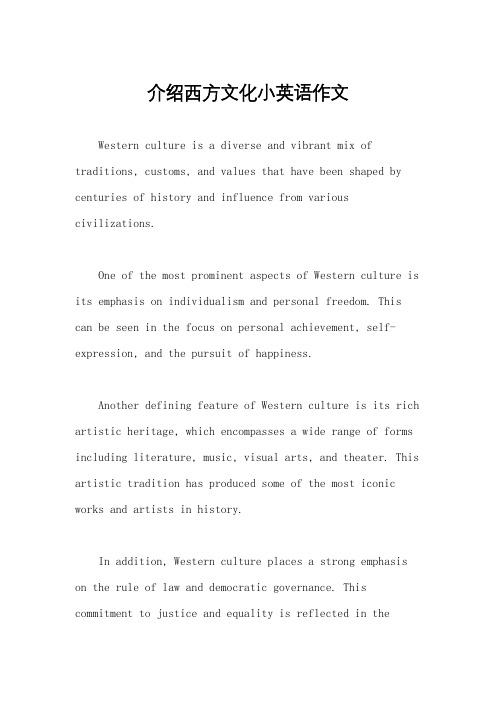
介绍西方文化小英语作文Western culture is a diverse and vibrant mix of traditions, customs, and values that have been shaped by centuries of history and influence from various civilizations.One of the most prominent aspects of Western culture is its emphasis on individualism and personal freedom. This can be seen in the focus on personal achievement, self-expression, and the pursuit of happiness.Another defining feature of Western culture is its rich artistic heritage, which encompasses a wide range of forms including literature, music, visual arts, and theater. This artistic tradition has produced some of the most iconic works and artists in history.In addition, Western culture places a strong emphasis on the rule of law and democratic governance. This commitment to justice and equality is reflected in thelegal systems and political institutions of Western societies.Furthermore, Western culture has a strong tradition of scientific inquiry and technological innovation. This hasled to major advancements in fields such as medicine, engineering, and information technology.Moreover, Western culture has a rich culinary tradition that varies widely from region to region. From Italianpasta to French pastries to American barbecue, the cuisineof the West is as diverse as its people.Finally, Western culture has a strong tradition ofsports and leisure activities, with a wide range of popular pastimes including football, basketball, skiing, and hiking.In conclusion, Western culture is a complex and multifaceted phenomenon that encompasses a wide range of traditions, values, and practices. Its rich history and diverse influences have shaped it into a dynamic and influential force in the world today.。
西方文化了解的英语作文

西方文化了解的英语作文英文回答:Western culture is a rich and diverse tapestry that encompasses a wide range of traditions, beliefs, and values. One aspect of Western culture that I find particularly fascinating is its emphasis on individualism. In Western societies, individuals are encouraged to express their unique identities and pursue their own goals and aspirations. This can be seen in various aspects of Western culture, such as the emphasis on personal achievement, the celebration of individual rights and freedoms, and the encouragement of self-expression in art, fashion, and lifestyle choices.Another interesting aspect of Western culture is its strong emphasis on democracy and the rule of law. Western societies place a high value on the principles of equality, justice, and accountability. This can be seen in the democratic systems of government that are prevalent in manyWestern countries, where citizens have the right to vote and participate in decision-making processes. The rule of law ensures that everyone is subject to the same set of laws and regulations, regardless of their social status or position of power.Furthermore, Western culture is known for itsscientific and technological advancements. Western societies have made significant contributions to fields such as medicine, engineering, and information technology. This emphasis on innovation and progress has led to numerous breakthroughs and advancements that have greatly improved the quality of life for people around the world. For example, Western countries have pioneered the development of vaccines, medical treatments, and communication technologies that have revolutionized healthcare and connectivity.In addition, Western culture places a strong emphasis on education and intellectual pursuits. Western societies value knowledge, critical thinking, and intellectual curiosity. This can be seen in the emphasis on formaleducation, the availability of libraries and educational resources, and the promotion of lifelong learning. Western countries have renowned universities and researchinstitutions that attract students and scholars from all over the world, fostering a vibrant intellectual community.中文回答:西方文化是一个丰富多样的织锦,包含了各种传统、信仰和价值观。
introduction to western culture

There was one big difference between Greeks and Romans. The Romans built up a vast empire: the Greeks didn’t, except for the brief moment of Alexander ’ s conquests, which soon disintegrated.
Christianity's Advantages
Its founder was an actual person. It had the Jewish legal code and tradition of morality.
Christianity appealed to the downtrodden masses. Women, low-skilled workers, prostitutes, the uneducated, slaves, fishermen, tax collectors, and so forth were the companions and "beloved" of Jesus, and a growing class of the oppressed and despised saw Christianity as the only faith that viewed them without contempt -- as "the salt of the Earth" -- and that offered them the hope of a better life -- sometime.
Odyssey
西方文化了解的英语作文
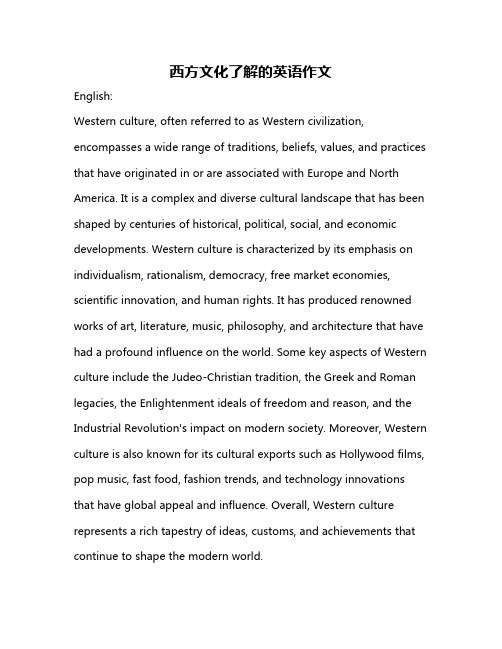
西方文化了解的英语作文English:Western culture, often referred to as Western civilization, encompasses a wide range of traditions, beliefs, values, and practices that have originated in or are associated with Europe and North America. It is a complex and diverse cultural landscape that has been shaped by centuries of historical, political, social, and economic developments. Western culture is characterized by its emphasis on individualism, rationalism, democracy, free market economies, scientific innovation, and human rights. It has produced renowned works of art, literature, music, philosophy, and architecture that have had a profound influence on the world. Some key aspects of Western culture include the Judeo-Christian tradition, the Greek and Roman legacies, the Enlightenment ideals of freedom and reason, and the Industrial Revolution's impact on modern society. Moreover, Western culture is also known for its cultural exports such as Hollywood films, pop music, fast food, fashion trends, and technology innovations that have global appeal and influence. Overall, Western culture represents a rich tapestry of ideas, customs, and achievements that continue to shape the modern world.中文翻译:西方文化,通常被称为西方文明,涵盖了起源于欧洲和北美洲或与之相关的广泛传统、信仰、价值观和实践。
西方文化介绍introduction of western culture lesson5 - The Age of Discovery大发现时代
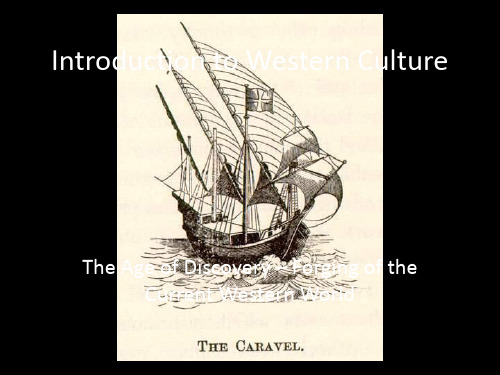
Dias: The most important voyager from Portugal.
Atlantic Ocean (1419-1507)
• Portugal – Prince Henry the Navigator
– Explored Madeira (1419) and Azores (1427) fairly early. – Exploration of Africa, for trading in Slaves and Gold. – Dias: 1487, to the Cape of Good Hope
– It lasted from 1519-1521
Cortes’ Mexico and the Aztec Empire
• Cortes went on an expedition into Mexico, to explore the country.
– It lasted from 1519-1521 – The Civilization they encountered their were the Aztecs. – The Aztecs took the Cortez and his men to their Capital City, Tenochtitlan.
Introduction to Western Culture
The Age of Discovery – Forging of the Current Western World
The Age of Discovery
• 15th-17th Century • Europeans began an intensive exploration of the world
介绍西方文化活动英语作文

介绍西方文化活动英语作文Introduction to Western Cultural Activities。
Western cultural activities are a great way to learn about and experience the diverse traditions and customs of different countries. These activities range from festivals and holidays to music, dance and theater performances, and art exhibitions.One of the most popular cultural activities in the Western world is the celebration of Christmas. This holiday is celebrated on December 25th and is a time for families to come together and exchange gifts. In addition to Christmas, there are many other holidays celebrated throughout the year, such as Easter, Halloween, and Thanksgiving.Another popular cultural activity is attending music concerts and festivals. Western music has a rich history and diverse genres, from classical to rock and roll,country, and pop. Music festivals such as Coachella, Glastonbury, and Lollapalooza attract thousands of fans from around the world.Theater and dance performances are also an important part of Western culture. Broadway shows in New York City, for example, are world-renowned for their high-quality productions. Ballet and modern dance performances are also popular, with famous companies such as the American Ballet Theatre and the Alvin Ailey American Dance Theater.Art exhibitions and museums are another way to experience Western culture. The Louvre in Paris, the Metropolitan Museum of Art in New York City, and the Tate Modern in London are just a few of the many famous museums that house some of the world's most famous works of art.In addition to these cultural activities, sports are also an important part of Western culture. Soccer, basketball, baseball, and American football are just a few of the many popular sports played and watched in the Western world.In conclusion, Western cultural activities offer a diverse range of experiences that allow people to learn about and appreciate the traditions and customs ofdifferent countries. From festivals and holidays to music, dance, and theater performances, and art exhibitions, there is something for everyone to enjoy.。
西方的文化介绍英文作文
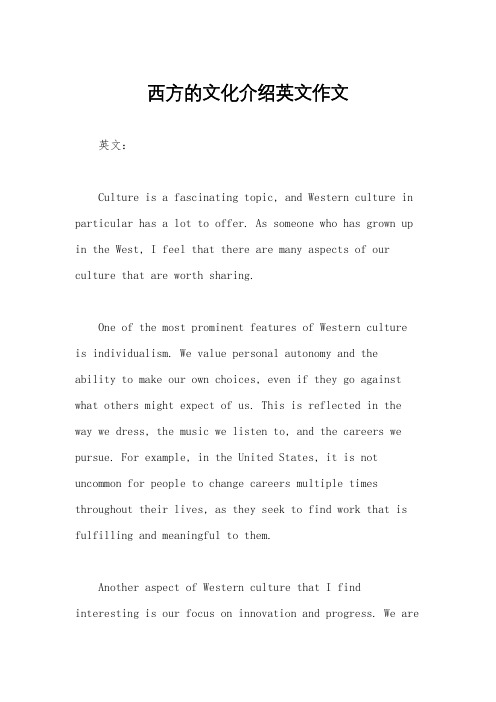
西方的文化介绍英文作文英文:Culture is a fascinating topic, and Western culture in particular has a lot to offer. As someone who has grown up in the West, I feel that there are many aspects of our culture that are worth sharing.One of the most prominent features of Western culture is individualism. We value personal autonomy and theability to make our own choices, even if they go against what others might expect of us. This is reflected in the way we dress, the music we listen to, and the careers we pursue. For example, in the United States, it is not uncommon for people to change careers multiple times throughout their lives, as they seek to find work that is fulfilling and meaningful to them.Another aspect of Western culture that I find interesting is our focus on innovation and progress. We arealways looking for new ways to improve our lives and the world around us, whether that means developing new technologies, exploring new frontiers, or pushing the boundaries of artistic expression. This drive for innovation is what has led to many of the great accomplishments of Western civilization, from the Renaissance to the Industrial Revolution to the space race.Of course, Western culture is not without its flaws. One criticism that is often leveled against us is that we can be overly materialistic and consumerist, focusing too much on accumulating wealth and possessions rather than on building meaningful relationships and pursuing spiritual growth. This is something that I think we need to be mindful of, and work to address in our own lives and in our broader society.Overall, I believe that Western culture has a lot to offer, both in terms of its strengths and its weaknesses. By learning about and engaging with different cultures, we can broaden our perspectives and become more well-rounded individuals.中文:文化是一个迷人的话题,尤其是西方文化有很多值得分享的地方。
西方文化引进中国的好处英语作文
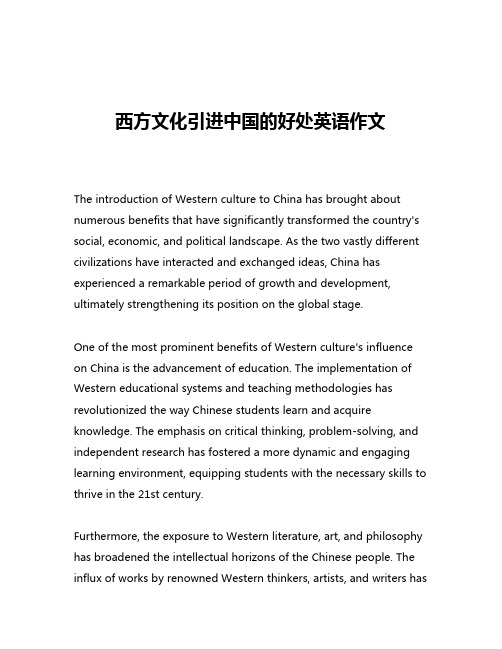
西方文化引进中国的好处英语作文The introduction of Western culture to China has brought about numerous benefits that have significantly transformed the country's social, economic, and political landscape. As the two vastly different civilizations have interacted and exchanged ideas, China has experienced a remarkable period of growth and development, ultimately strengthening its position on the global stage.One of the most prominent benefits of Western culture's influence on China is the advancement of education. The implementation of Western educational systems and teaching methodologies has revolutionized the way Chinese students learn and acquire knowledge. The emphasis on critical thinking, problem-solving, and independent research has fostered a more dynamic and engaging learning environment, equipping students with the necessary skills to thrive in the 21st century.Furthermore, the exposure to Western literature, art, and philosophy has broadened the intellectual horizons of the Chinese people. The influx of works by renowned Western thinkers, artists, and writers hasenriched the cultural landscape, inspiring Chinese scholars and creatives to engage in cross-cultural dialogues and explore new avenues of expression. This exchange of ideas has led to the emergence of a more diverse and vibrant cultural scene, where traditional Chinese values coexist harmoniously with Western influences.The economic benefits of Western culture's integration into China are also undeniable. The adoption of Western business practices, management strategies, and technological innovations has propelled China's economic growth to unprecedented levels. The incorporation of Western financial systems, investment models, and marketing techniques has enabled Chinese companies to become more competitive in the global marketplace, attracting foreign investment and expanding their reach beyond the country's borders.Moreover, the introduction of Western consumer culture has transformed the lifestyle and purchasing habits of the Chinese population. The availability of a wider range of products, services, and entertainment options has not only diversified the consumer landscape but also encouraged the development of a thriving middle class. This shift in consumer behavior has contributed to the overall economic prosperity of the nation, as the growing demand for goods and services fuels the country's industrial and commercial sectors.In the realm of social and political reforms, the influence of Western culture has been instrumental in shaping China's transformation. The promotion of democratic principles, human rights, and the rule of law has inspired Chinese citizens to advocate for greater individual freedoms and civil liberties. While the pace of these reforms may vary, the gradual integration of Western values has undoubtedly challenged the traditional power structures and encouraged a more open and inclusive political discourse.Furthermore, the exposure to Western media, communication technologies, and social platforms has empowered the Chinese people to access a broader range of information, connect with the global community, and voice their opinions more freely. This increased access to information and the ability to engage in cross-cultural exchanges have fostered a more informed and engaged citizenry, contributing to the ongoing process of social and political evolution in China.Additionally, the influence of Western culture has had a positive impact on China's approach to environmental protection and sustainability. The adoption of Western environmental regulations, clean energy technologies, and eco-friendly practices has helped China address pressing environmental challenges, such as air pollution, water scarcity, and the preservation of natural habitats. This shift towards a more sustainable development model has notonly improved the quality of life for Chinese citizens but also positioned the country as a global leader in the fight against climate change.In the realm of healthcare, the integration of Western medical practices and technologies has revolutionized the Chinese healthcare system. The introduction of advanced diagnostic tools, surgical techniques, and pharmaceutical innovations has greatly improved the quality of medical care, leading to better health outcomes for the Chinese population. Furthermore, the collaboration between Chinese and Western healthcare professionals has facilitated the exchange of knowledge and the development of more comprehensive and effective treatment protocols.Finally, the exposure to Western cultural traditions and customs has enriched the social fabric of China, fostering a greater appreciation for diversity and cross-cultural understanding. The incorporation of Western festivals, cuisines, and recreational activities has not only broadened the cultural horizons of the Chinese people but also encouraged the preservation and celebration of their own unique heritage. This cultural exchange has strengthened the bonds between China and the global community, promoting mutual understanding and respect.In conclusion, the integration of Western culture into China hasbrought about a myriad of benefits that have transformed the country in significant ways. From advancements in education and the economy to social and political reforms, the influence of Western culture has contributed to China's remarkable progress and solidified its position as a global powerhouse. As China continues to navigate the challenges and opportunities presented by this cultural exchange, the country's future remains bright, with the potential to forge even stronger ties with the rest of the world.。
- 1、下载文档前请自行甄别文档内容的完整性,平台不提供额外的编辑、内容补充、找答案等附加服务。
- 2、"仅部分预览"的文档,不可在线预览部分如存在完整性等问题,可反馈申请退款(可完整预览的文档不适用该条件!)。
- 3、如文档侵犯您的权益,请联系客服反馈,我们会尽快为您处理(人工客服工作时间:9:00-18:30)。
H
X
Y
Culture Is Adaptive
• Culture helps human societies survive in changing natural environments • Cultural adaptation has made humans one of the most successful species on the planet • The successes of culture can also create problems in the long run (i.e. nature degradation)
H
X
Y
Culture is Symbolic
• Communication with symbols
– Language – Other forms of symbolic communication, such as art – Human vocal tract
H
X
Y
Culture is Learned
human has culture (?).
H X Y
Development of Culture
• Culture developed together with the evolution of the human species, Homo sapiens, and is closely related to human biology. The ability of people to have culture comes in large part from their physical features: having big, complex brains; an upright posture; free hands that can grasp and manipulate small objects; and a vocal tract that can produce and articulate a wide range of sounds. These distinctively human physical features began to develop in African ancestors of humans more than four million years ago. The earliest physical evidence of culture is crude stone tools produced in East Africa over two million years ago.
(iii) an "associative cultural landscape" which may be valued because of the "religious, artistic or cultural associations of the natural element"
H
X
Y
Questions
Scientific Explanation
The patterns of behavior and thinking that people living in social groups learn, create, and share. Culture distinguishes one human group from others. It also distinguishes humans from other animals. A people’s culture includes their beliefs, rules of behavior, language, rituals, art, technology, styles of dress, ways of producing and cooking food, religion, and political and economic systems.
– one’s culture is more sensible than or superior to that of other societies – Ethnocide and Genocide
• cultural relativism
– The process of advocating cross-cultural understanding; learning to respect beliefs and practices
• Edward Taylor
– culture includes socially acquired knowledge, beliefs, art, law, morals, customs, and habits.
H
X
Y
Culture and Society
• Culture is the most important concept in anthropology (the study of all aspects of human life, past and present). Anthropologists commonly use the term culture to refer to a society or group in which many or all people live and think in the same ways. Likewise, any group of people who share a common culture—and in particular, common rules of behavior and a basic form of social organization—constitutes a society. Thus, the terms culture and society are somewhat interchangeable. However, while many animals live in societies, such as herds of elk or packs of wild dogs, only
• Enculturation (cultural transmission)
– People are not born with culture – In all human societies, children learn culture from adults. – Enculturation is a long process.
H X Y
Sharing Culture Across Societies
• Since no human society exists in complete isolation, different societies also exchange and share culture • Cultural exchange can provide many benefits for all societies • Cross-cultural exchange often results in what anthropologists call acculturation, when the members of one culture adopt features of another
Introduction to Western Culture
Hans Ho All rights reserved to hh_kunming@
H
X
Y
Defining Culture
Common Understanding
• All the human endeavors since the very beginning of the human history, or might be even long before the recorded history of the human race; i.e. language, buildings, traditions, eating habits, living styles, literature, family patterns and so on. •
• Discuss the four major characteristics of culture.
H
X
Y
H
X
Y
Sampling Cultures of the World
Chinese family enjoy meal
Cultural Celebrations in the U.S.
French Farmers’ Protest
• • • • • What is the definition of culture? What is the scope of western culture? What characteristics does culture convey? Define culture in both the common and scientific senses. Clarify the statement ―Culture is adaptive‖.
Tribal African Life in Western Africa
H X Y
Characteristics of Culture
• Culture is based on symbols—abstract ways of referring to and understanding ideas, objects, feelings, or behaviors—and the ability to communicate with symbols using language • Culture is shared. People in the same society share common behaviors and ways of thinking through culture. • Culture is learned. While people biologically inherit many physical traits and behavioral instincts, culture is socially inherited. A person must learn culture from other people in a society. • Culture is adaptive. People use culture to flexibly and quickly adjust to changes in the world around them.
